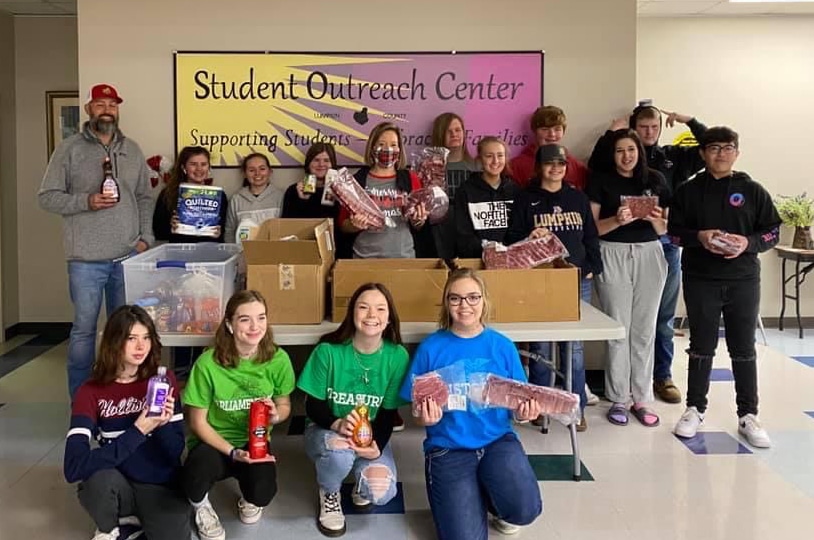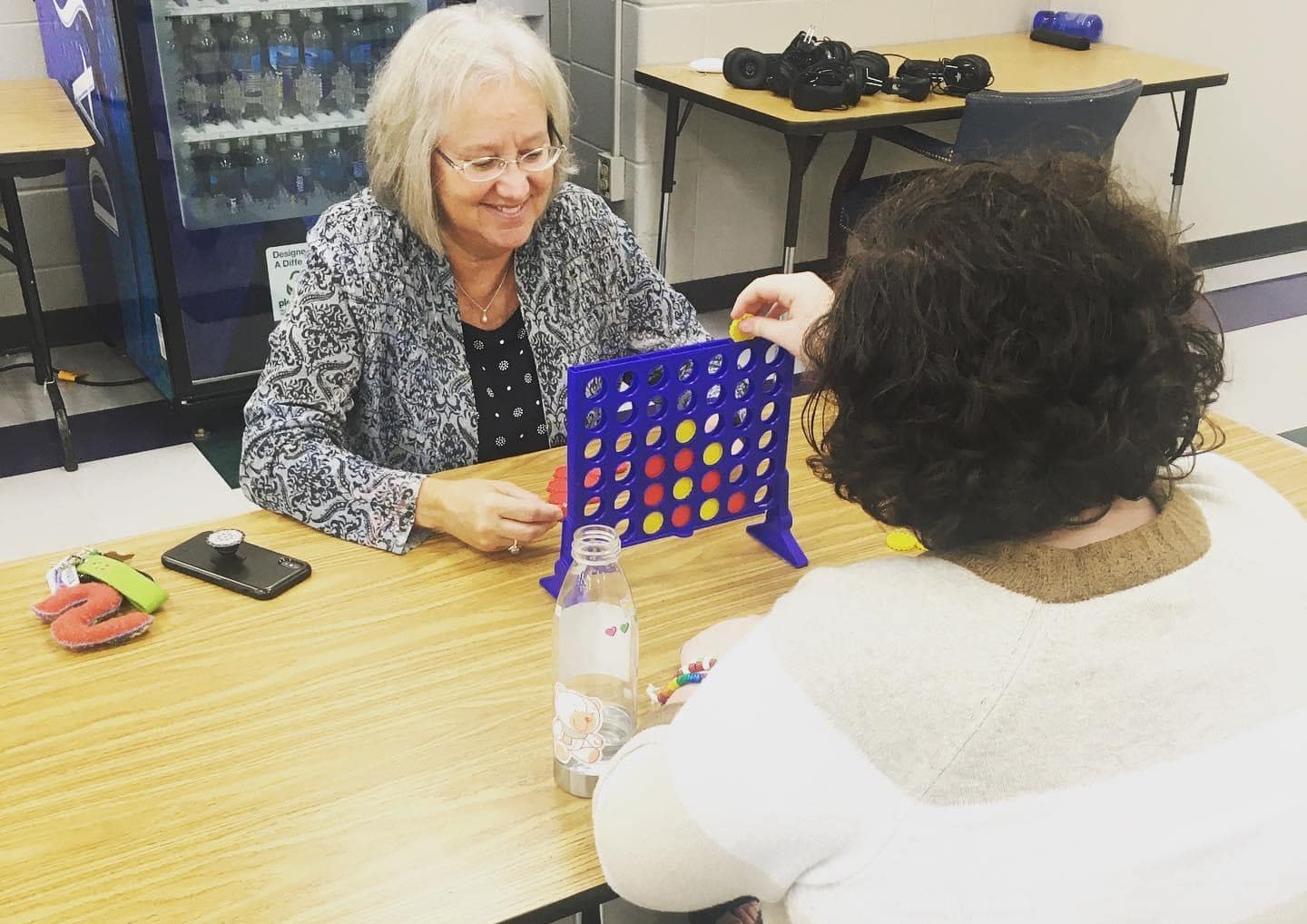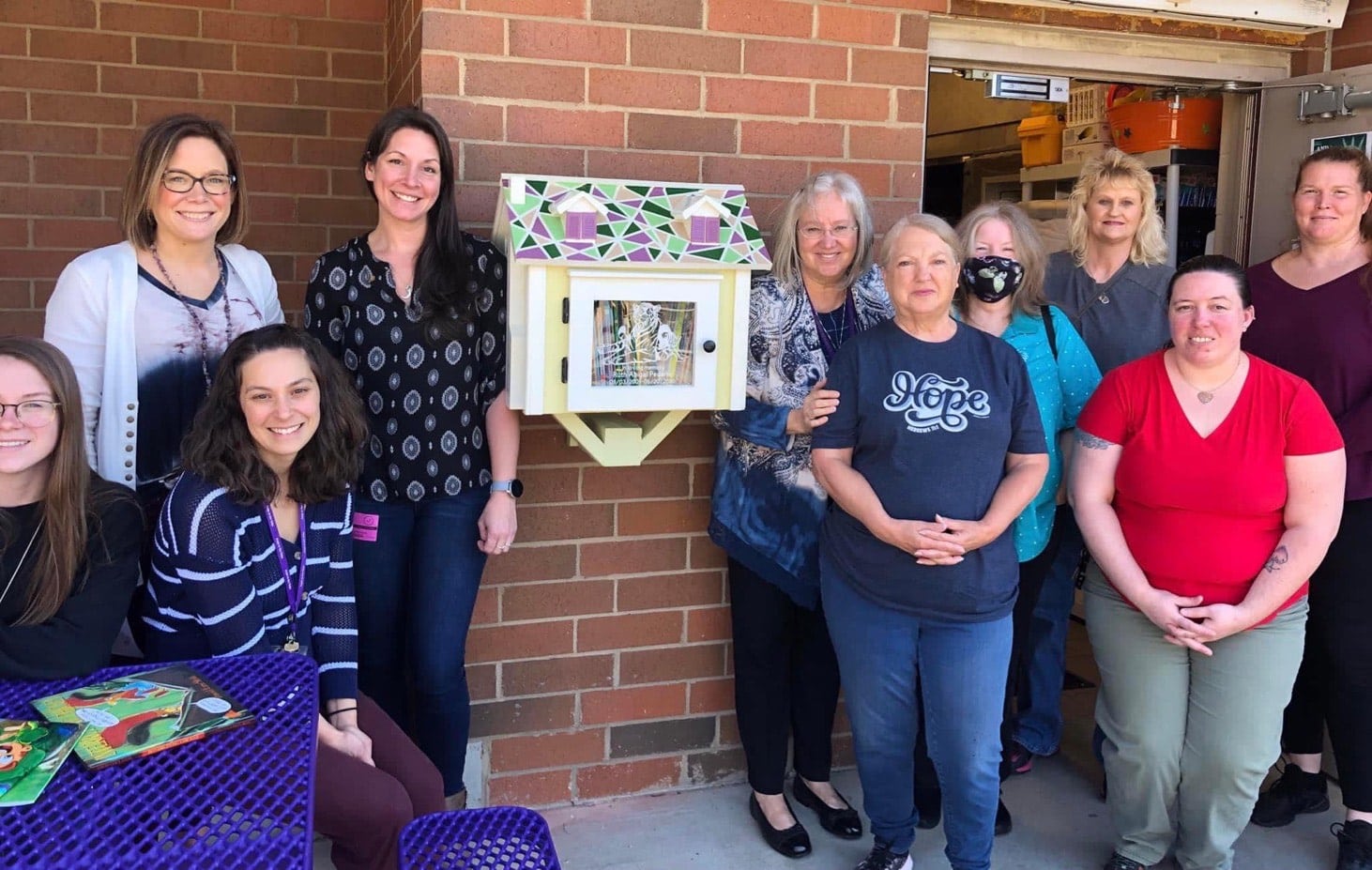Lumpkin Student Outreach Center Spreads Hope and Offers Pathways to Support for Families
Print This PostBy Diana St. Lifer
When several middle-school cafeteria workers witnessed students picking apples from the trash in Lumpkin County six years ago, they took their concerns to a school counselor who immediately reached out to Lumpkin County Family Connection.
“The counselor wanted to know if there was something we could do, so we began a Backpack Buddies program,” said Brigette Barker, the Collaborative’s executive director. “That’s how it all started.”
The space where backpacks of food were distributed has evolved into a comprehensive Student Outreach Center where students and families can go for support, resources, essential items, training and education, and social activities. The center distributed 46,000 pounds of food to children in Lumpkin County last year.
Lumpkin Family Connection is part of Georgia Family Connection Partnership’s Family Support Cohort focused on developing, implementing, and evaluating child abuse and neglect prevention county-specific strategies.
“When we joined the cohort, I visited Restoration Rome in Floyd County to see what they had developed,” said Barker. “That’s when we realized all our services needed to be offered under one roof so we could help more kids.”

In 2021, the center also provided school supplies to 470 students; clothing and shoes for 653 children; more than 1,000 hours of life skills education, support groups, enrichment activities, and individual parenting education; and $20,400 in emergency assistance for 107 families.
Christina Rushadi, who has two children in the school system—second grader Aiden and kindergartener Yuna—has been going to the Outreach Center for a couple of years.
“I started going to the weekly meetings for information about helping our kids do better in school and how to be a more involved parent with their education,” Rushadi said. “During pandemic, the Center helped so many families struggling with basic living needs. Now that things are looking up, we’ve been receiving help on getting our finances in order and learning about the steps we need to take so we can actually buy a home.”
The Center is located in a middle-school cafeteria that was no longer in use. A large student services area is surrounded by offices for a mental health counselor, two school counselors, school social worker, family advocate, parent involvement specialist, nurse, and Lumpkin County Family Connection.
It’s an ideal location with the adjoining elementary and charter schools and a short drive to the high school. “It really is a central location where the largest student population is,” Barker said.
The food pantry was the first program to get up and running. There was already shelving in place, so the Collaborative secured grant funding and partnered with the Georgia Mountain Food Bank.
The clothing closet came next. “We raised funds and worked with The Home Depot, which gave us a discount and helped us install a clothing organizer,” said Barker. “The community came together to donate a washer and dryer, and new clothing is donated throughout the year.”
The center offers three pathways of assistance: General Services, Career Services, and Family Development.

General Services encompasses information, referrals, or non-cash assistance such as food, clothing, school supplies, and hygiene items. From students selecting outfits for scholarship interviews to a child grabbing a binder for class, these services are offered daily.
The Career Services path includes parenting and support groups, trainings, and the Backpack Buddies program, along with emergency financial assistance. Families on this path come in weekly and have consistent contact with the Center’s team.
Families on the Family Development pathway actively work with an advocate using assessments to track progress toward their goals. They receive individualized support to solve major problems, thanks to Promoting Safe and Stable Families funding.
“We work with families using a strengths-based approach for setting goals and then follow up with opportunities and resources to help them work toward those goals,” she said.
The Center’s family advocate, along with those located at each of the elementary schools, are essential to this work. “The advocates need to be accessible because we’re a rural community, and lack of transportation is a barrier,” said Barker.
The Student Outreach Center works with 60 to 70 families at any given time. While the Center at the middle school is the main hub, other schools have mini centers.
The Center also sponsors celebrations for holidays and school events as well as local trips. This year, 80 parents and students visited the Consolidated Gold Mining Company in Dahlonega, panning for gems and touring an underground mine.
Rushadi said families should take advantage of the Center’s programs. “There’s so much information and resources that most people don’t know about,” she said. “People often have issues with asking for help, but everyone at the center makes you feel welcome and never looked down upon. I have learned so much and I feel like I’ve become a better person and more involved parent because of everything they’ve taught me.”

Now, other Georgia Family Connection Collaboratives visit Lumpkin’s Student Outreach Center to learn how to potentially replicate the model in their own communities. “The key to success,” Barker said, “is committed partners—schools, library, food bank, sheriff’s office, businesses, organizations—and a cadre of dedicated volunteers.”
The data show the needle is slowly but surely moving in Lumpkin County. The rate of children with a substantiated incident of abuse and/or neglect (per 1,000) in Lumpkin went from 23.5 in 2015 to 9.7 in 2019, according to the KIDS COUNT Data Center.
“When we have individual successes, the parents see for themselves that their kids’ grades, behavior, and attendance are improving,” said Barker. “They realize the importance of the work—and we see the whole picture of the family and how they’re growing together. Sometimes that shows us even more than we can capture with the data.”
Barker sees the Center’s impact every day. “We’re meeting concrete basic needs, and that’s huge,” she said. “But the other thing we see is giving families a support system and hope. You can’t measure that with numbers.”
Contact:
Krystin Dean
GaFCP Communications Specialist
706-897-4711
krystin@gafcp.org
Follow us on Twitter: @gafcpnews
Connect with us on Facebook.
